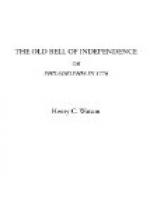’The motley crew, in vessels new,
With Satan for their guide, sir,
Pack’d up in bags, or wooden kegs,
Come driving down the tide, sir.
’Therefore prepare for bloody war!
These kegs must all be routed;
Or surely we despised shall be,
And British courage doubted.’
The royal band now ready stand,
All ranged in dread array, sirs;
With stomach stout, to see it out,
And make a bloody day, sirs.
The cannons roar from shore to shore,
The small arms make a rattle;
Since wars began, I’m sure no man
E’er saw so strange a battle.
The rebel vales, the rebel dales,
With rebel trees surrounded,
The distant woods, the hills and floods,
With rebel echoes sounded.
The fish below swam to and fro,
Attack’d from every quarter:
Why, sure, thought they, the devil’s
to pay
’Mongst folks above the water.
The kegs, ’tis said, though strongly
made,
Of rebel staves and hoops, sirs,
Could not oppose their powerful foes,
The conquering British troops, sirs.
From morn to night, these men of might
Display’d amazing courage;
And when the sun was fairly down,
Retired to sup their porridge.
A hundred men, with each a pen,
Or more—upon my word, sirs,
It is most true—would be too
few
Their valor to record, sirs.
Such feats did they perform that day
Upon these wicked kegs, sirs,
That years to come, if they get home,
They’ll make their boasts and brags,
sirs.”
“Ha! ha! that’s a good thing. The enemy used to be so fond of the word ‘rebel’ that they would attach it to the most trifling things, when speaking of our people. Judge Hopkinson ridicules that in fine style,” remarked old Harmar.
“It ought to be sung to the tune of the ‘Hoosier’s Ghost,’” said Wilson.
“Who is the Sir Erskine alluded to in the song?” inquired Mrs. Harmar. “Sir William Erskine, one of Sir William Howe’s officers,” replied old Harmar. “This song created much merriment among the whigs at the time it was written, so that, however much the enemy were right, we had the laugh on our side.”
“But what were the circumstances which gave rise to it?” inquired Mr. Jackson Harmar, impatiently.
“I was about to tell you,” replied his father. “A Mr. David Bushnell had invented several ingenious articles of submarine machinery, for the purpose of destroying the British vessels stationed in the Delaware. Among these was the American torpedo, a machine shaped like a water tortoise, and managed by a single person. It contained sufficient air to support respiration thirty minutes without being replenished, valves to admit or reject water for the purpose of rising or sinking, ballast to keep it upright, and a seat for the operator. Above the rudder was a place for carrying a large powder




